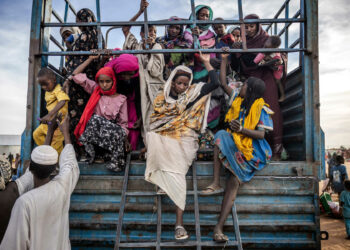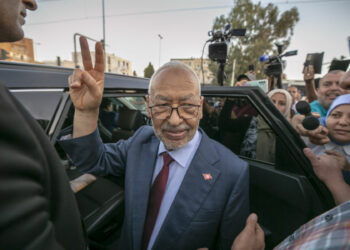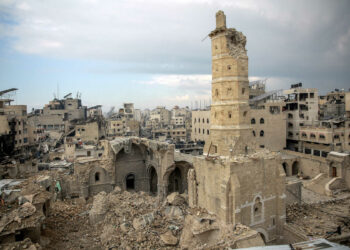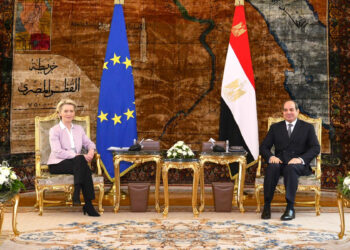Omid Memarian, a journalist, analyst and recipient of Human Rights Watch's Human Rights Defender Award, is the Director of Communications at DAWN.
In an interview with DAWN, famed Sudanese visual artist Assil Diab discusses her artwork, her motivation, and how visual art, murals, and graffiti can bring communities together in a time of conflict.
عربی
The 2018-2019 Revolution in Sudan presented a major shift in the power dynamic of North Africa. The majority of revolutionaries engaged in civil disobedience until president Omar al-Bashir, who remained in power for over 30 years, was deposed and removed from office.
During the revolution, many Sudanese artists joined the people in the streets and used their art to encourage and strengthen the message of those who sought change.
Assil Diab was amongst those artists who used "street art and graffiti as a weapon against the pro-government supporters and the army."
Diab was born in Bucharest, Romania, in 1988, where her father was the ambassador to Sudan. She has lived in Qatar since 1995 and obtained her Bachelor of Fine Arts from Virginia Commonwealth University in 2011 in graphics design. She told DAWN that her exposure to the European, American, and Arab cultures greatly influenced her personality and art.
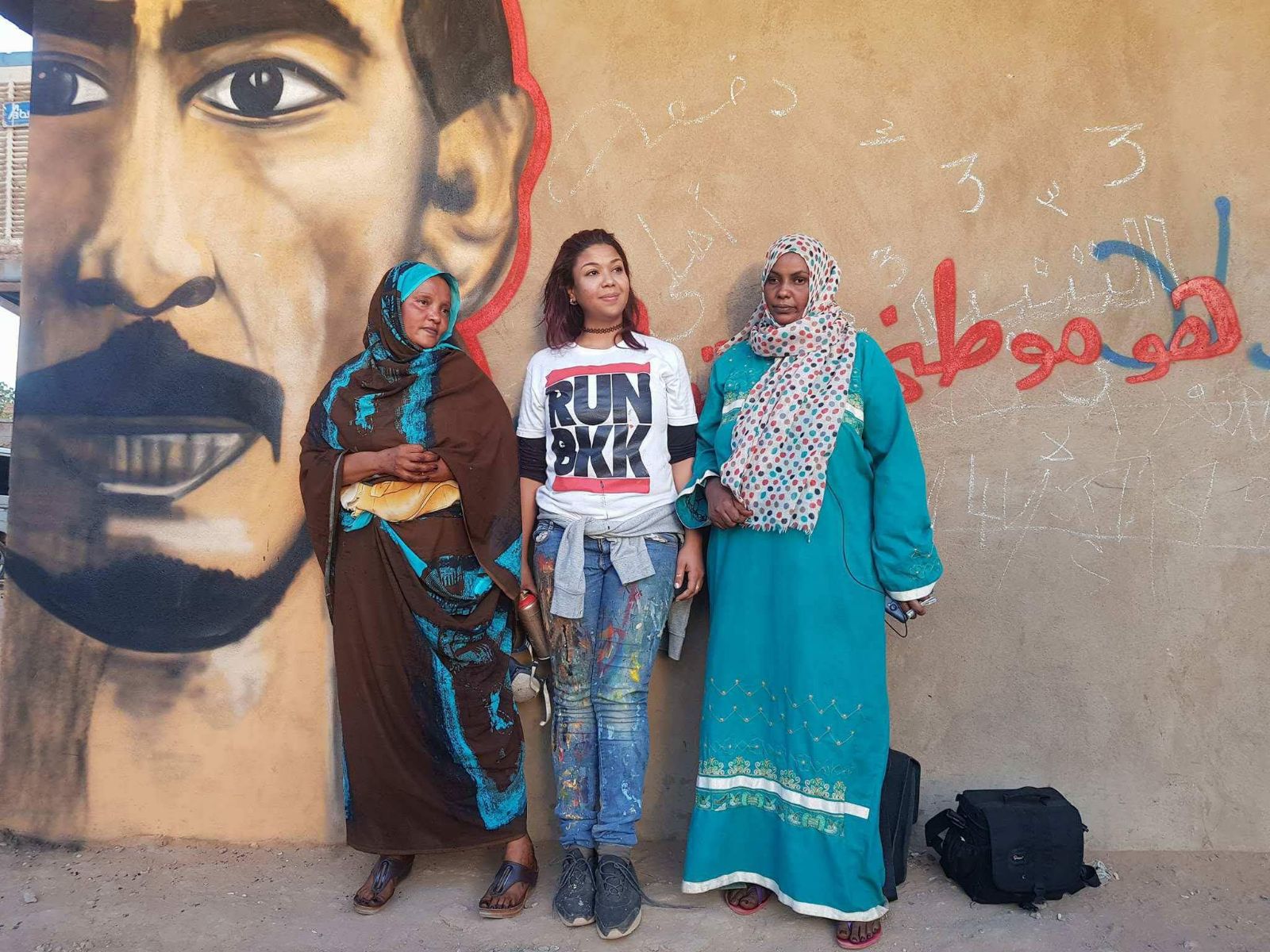
Since her graduation in 2011, she has worked as a graphics designer, branding and promotions coordinator, and a creative designer at the Qatar Red Crescent, Doha Film Institute, and Al Jazeera Children's Channel. In 2013, she began an internship with Ashghal and Qatar Museums Authority, assisting Calligraffiti artist 'El Seed' to paint 52 tunnels where she picked up spray painting techniques and cursorily became familiarized with the art form. Shortly after that experience, she decided to become a full-time artist and became Qatar and Sudan's first female graffiti artist, known as "Sudalove."
In this interview with DAWN, Diab explains how she began her career as a full-time visual artist, the risks she faced during the revolution and the different forms of civil disobedience that she and others around her engaged in to benefit the cause of the revolution.
Excerpts from the interview follow:
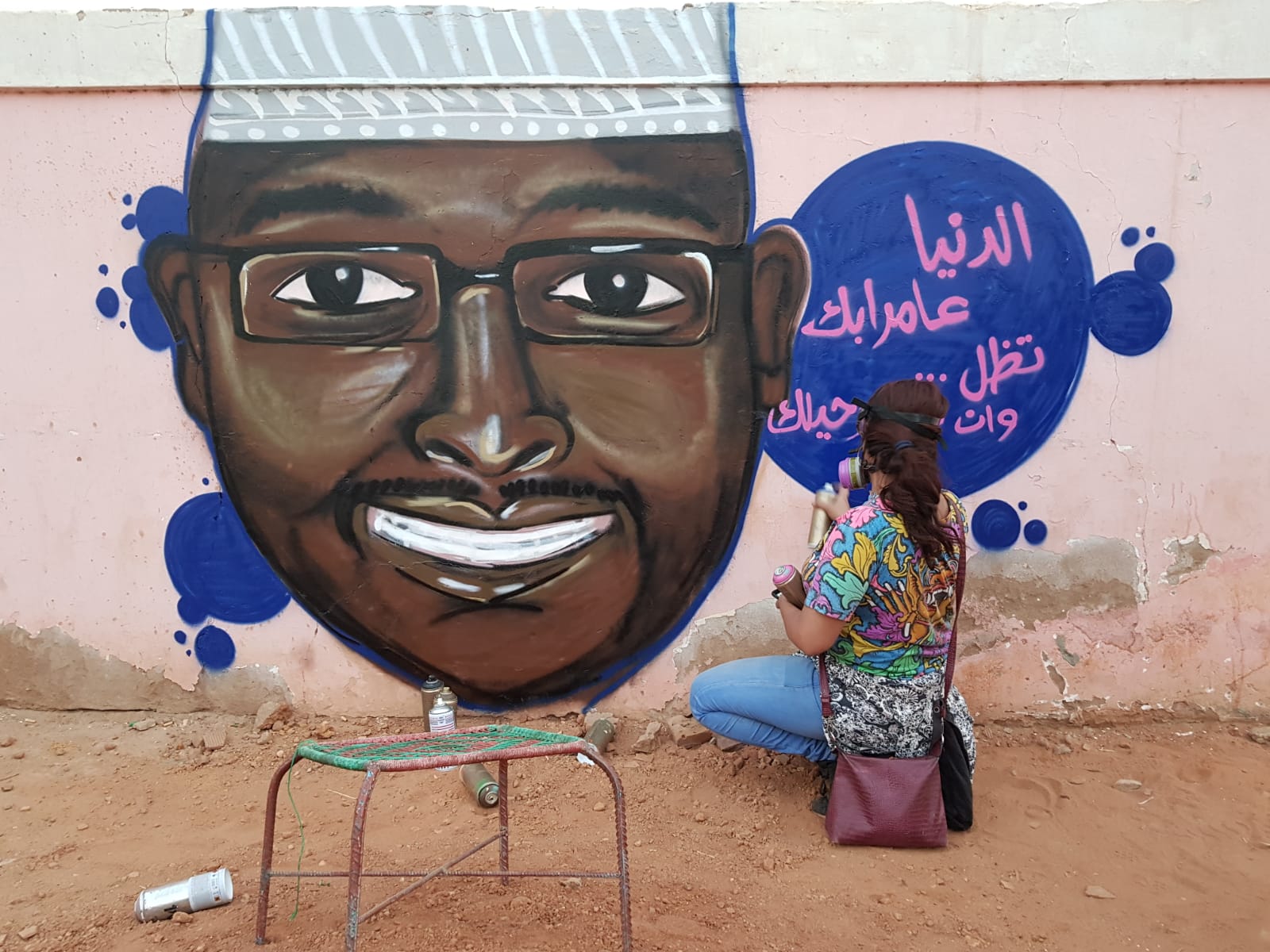
DAWN: Many artists participated in the 2019 Sudan Revolution by creating art pieces inspired by those who asked for change and demanded democracy. How did you get involved?
Diab: When I first started doing street art in 2012, the first year or two, I was practicing, just doing graffiti for fun; name tags, playing with fonts, nothing elaborate. Then I got into doing more intricate portraits. I began doing portraits of Sudanese celebrities, politicians, poets, musicians, etc. Just people who I thought contributed to our society and the environment and are Sudanese in culture.
They were people who didn't know about them before I actually painted them because I didn't live in Sudan. I would have a conversation with somebody, and then somebody's name would be brought up, and that would be the inspiration for me to go paint them somewhere, and maybe their accomplishment, too.
For example, I painted Aisha Al Falatiya in 2016. I believe she was the first woman to appear on the radio in Sudan. I also painted Fatima Ahmed Ibrahim, the first female member of the Sudanese Parliament; her portrait was actually wiped out a few hours after I painted her because her father was the leader of the Communist Party.
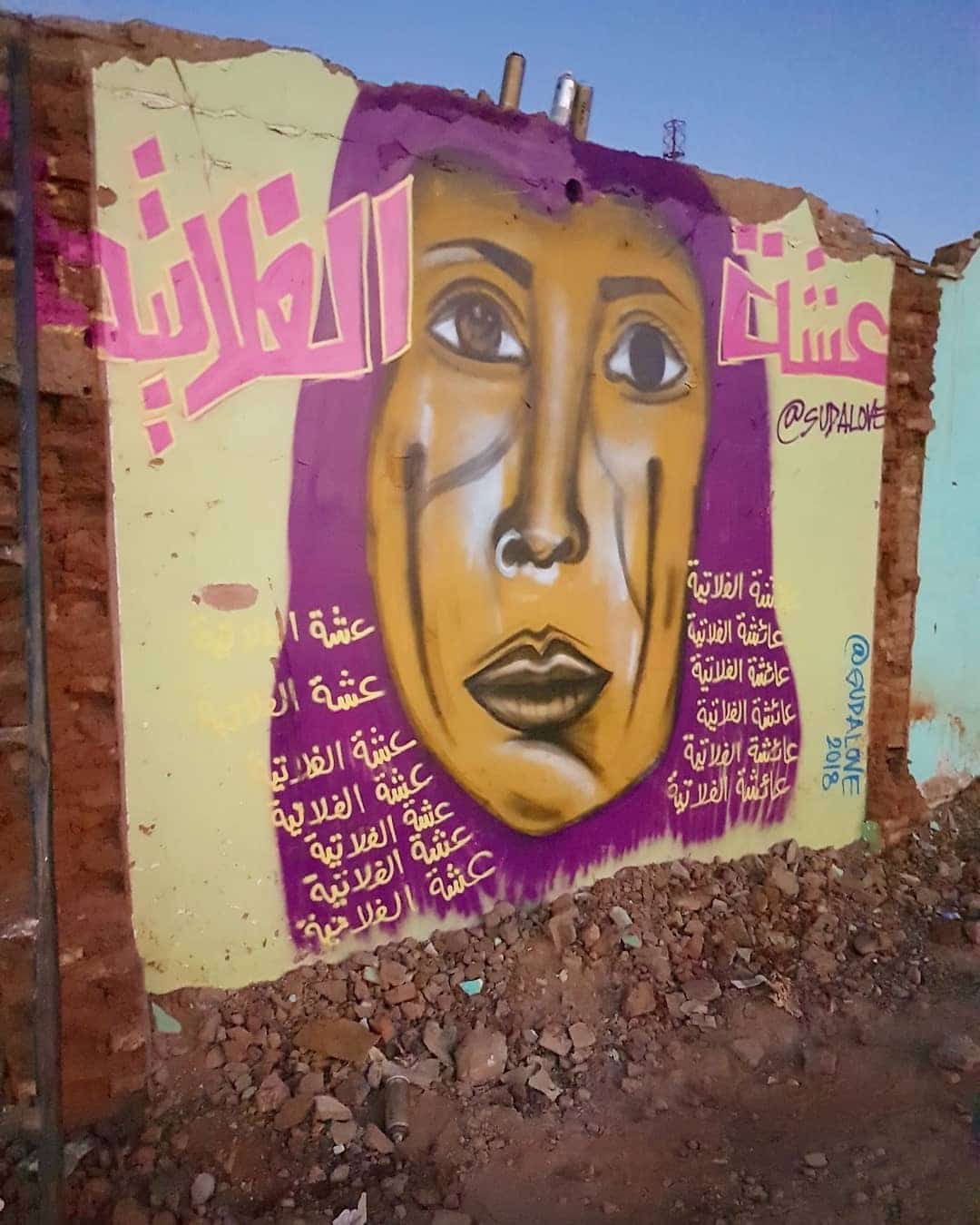
DAWN: What did you do during the revolution, and what opposition did you face?
Diab: I did the martyrs' graffiti project, the first art project during the revolution. It took place in January 2019, a time where there was no art taking place, alongside the protests. A team of volunteers and I worked for about three months; this was five months before the sit-in protest at the Military Headquarters that took place in May.
Three months later, we painted around 20 martyrs in their houses, using spray paint I brought with me from Qatar. I brought the spray paint with me in my luggage, flying into Khartoum. I was financing the project all on my own. We're talking about $627 per portrait (that's how many spray paint cans I was using). And I was also paying for my transport back and forth to these martyrs' houses, and most other times Mohamed ElSadig, also a project volunteer, was my main transport. Others working with me were Shams Mubarak, Sahar Al Rayyeh, Eythar Gubara, Mohamed Shawgi, Hajouj Kuka, Anas AlTayeb, ElFatih Suliman, and Mohamed Ahmed.
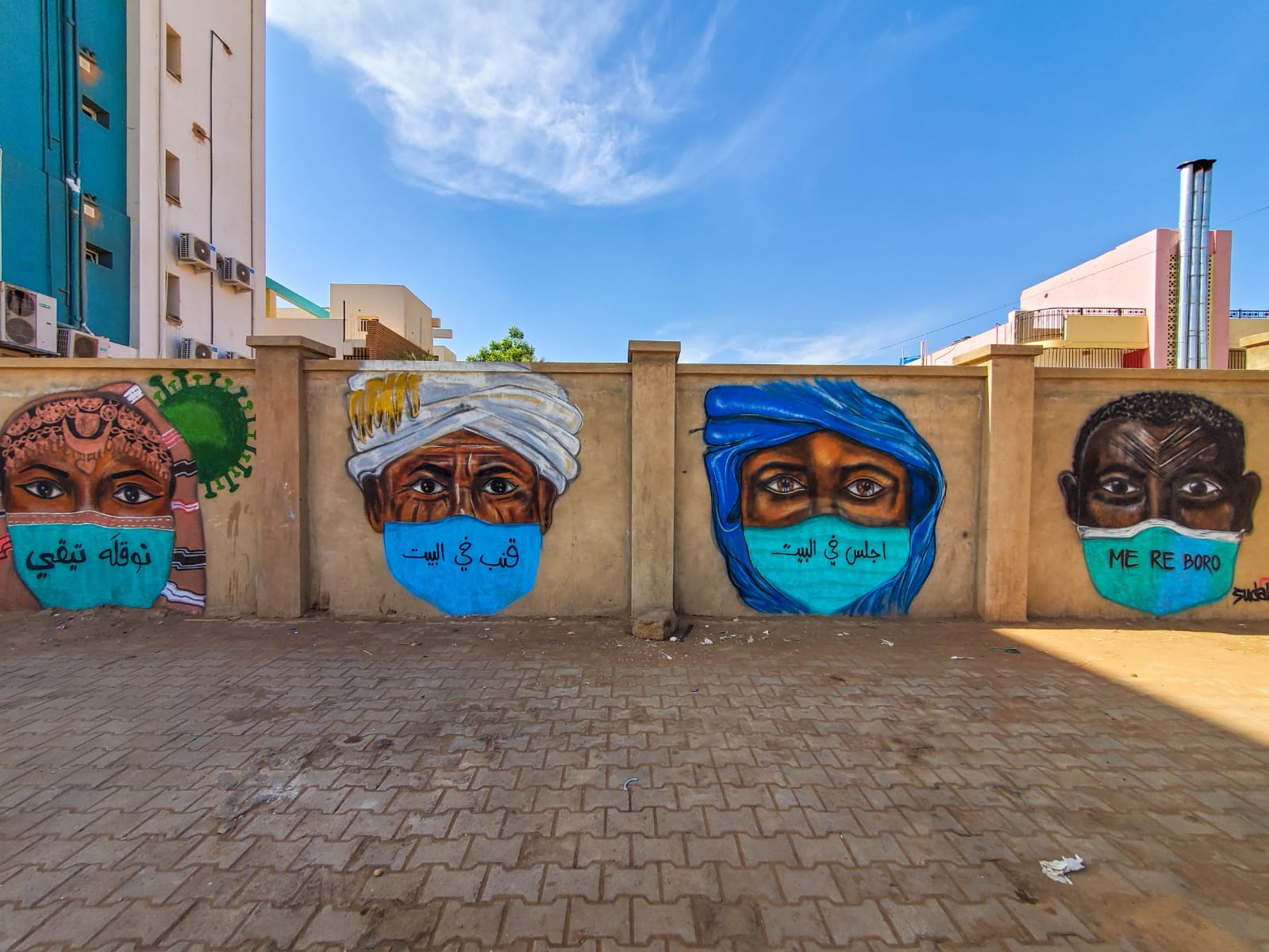
That was when I thought that I couldn't do anymore because the money was gone and the spray paint was almost finished. I flew back to Qatar in March or June. And then I didn't know if there was going to be another sit-in protest. Nobody had anticipated that to happen. When I saw the military sit-in that took part in the headquarters, I immediately returned to Khartoum, specifically to visit the sit-in and take part there. But I made it a point not to exert my efforts to paint in the sit-in because I wanted to use street art outside of the city as a weapon against the pro-government supporters and the army.
I continued doing the marchers' graffiti project, and I also used stickers. I used them as another form of street art to stick the sticker anywhere in light poles and people's doors on cars. I also was tagging by writing comments or proverbs. I also tried to use marker pens without bringing any attention to myself– but, you know, stickers are easier just to stick and get away with. We had lots of footage of us doing that, but all the cameras and all the tapes that we had were unfortunately lost.
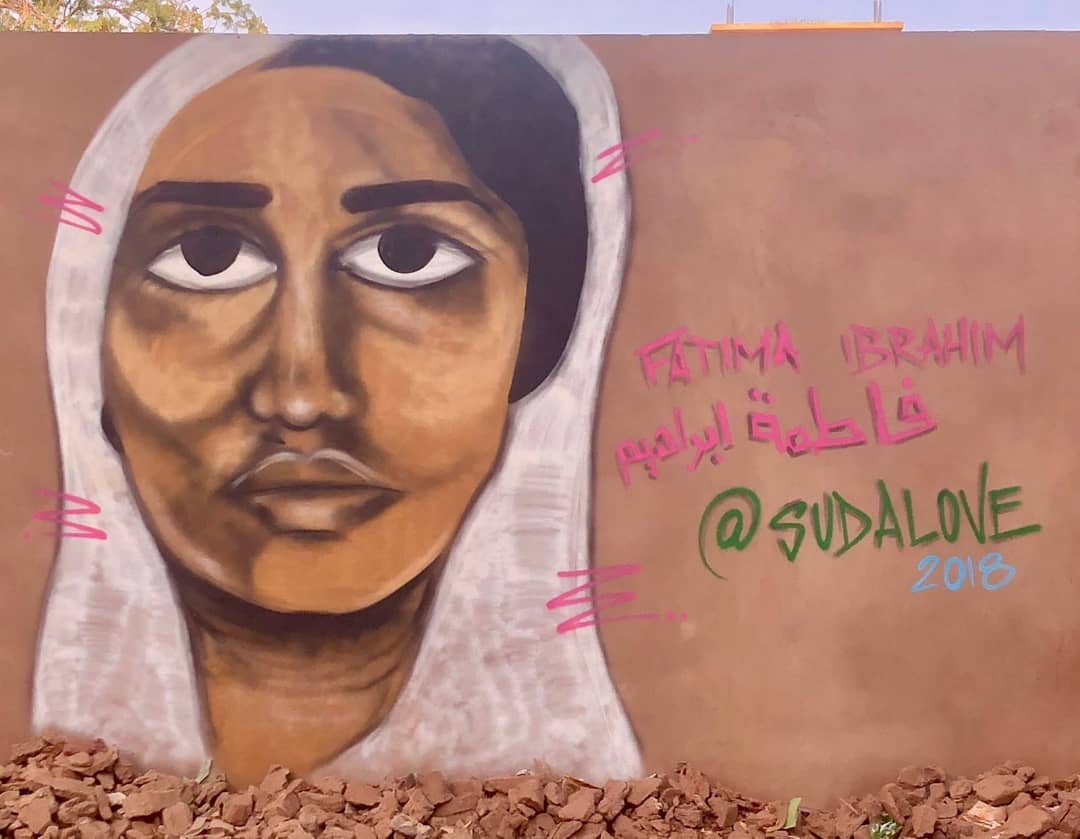
In the crackdown of the sit-in, they broke our cameras; they broke our laptops. We lost all that footage. And the aftermath of the martyrs' graffiti project was the first project that took place in January. That was the hardest time to paint. You couldn't even stand in the streets back then because the government forces were parked in every corner in Sudan. It was easy for them to shoot you.
It was a risk at the time. And I knew it was not just a risk for myself, but it was also a risk for the people who wanted to help me with this project. But I always made sure to tell them they are putting themselves at risk. They wanted to do it anyway; what they would say is, we are putting ourselves at risk by protesting, and that's being with thousands of people. And with this project, we're fewer than ten people.
It was just a different way to protest. And it was just as vital because there was no visual aspect to this revolution. Everybody was protesting. There were many chants, a lot of poetry, which is a different form of art. But there was no visual revolution per se. There were a lot of people also doing artwork and illustrations, but that was online. It was on Twitter and Instagram, but something needed to be done in the streets here, and that's where we came in. And then five months later, everybody was doing it, too.
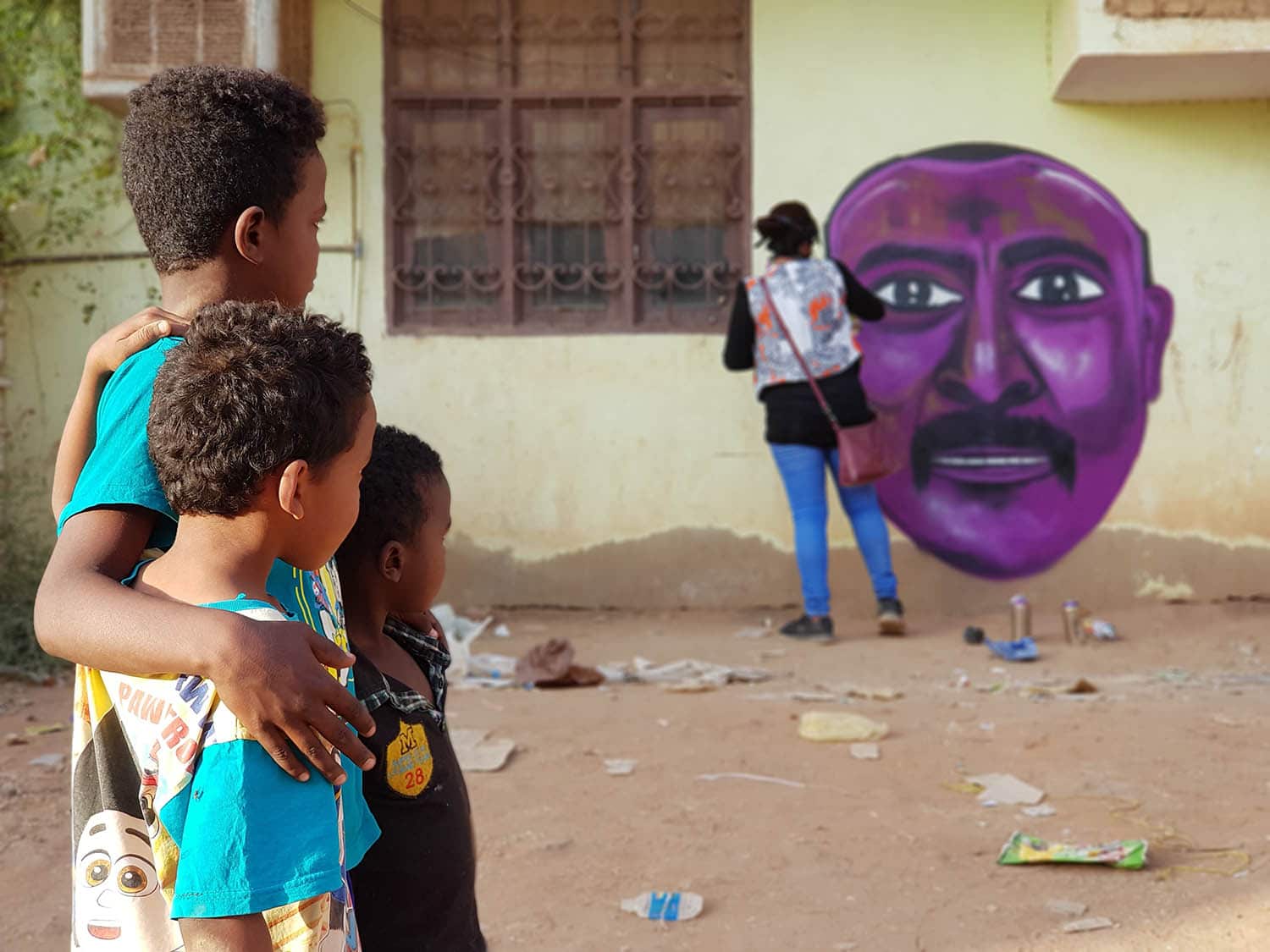
DAWN: Who tried to prevent you from using your artwork?
Diab: There are two kinds of people that usually try to impede, stop or even break me. Those would be some authoritative figures who abuse their power as law enforcers or anyone from policemen to security guards, and very 'religious' people. Most police officers tend to want to arrest me for the sole purpose of being a Sudanese female painting in the streets. Law 152 of the Sudanese public order system states that Sudanese women face arrest and up to 40 lashes if they violate the act. The law intended to prohibit so-called "indecent and immoral acts."
In a recent trip to Sudan, I had painted a mural of the late Mahmoud Abdul-Aziz, a popular Sudanese singer and humanitarian, in his neighborhood in the Al Mazad area, only for it to be removed and painted over by a man claiming that drawing anything that 'possesses' a soul in Islam is haram or forbidden. I believe that I am a Sudanese woman painting in the streets without reservations, without being conservative, without a headscarf, had more to do with his actions than a religious one.
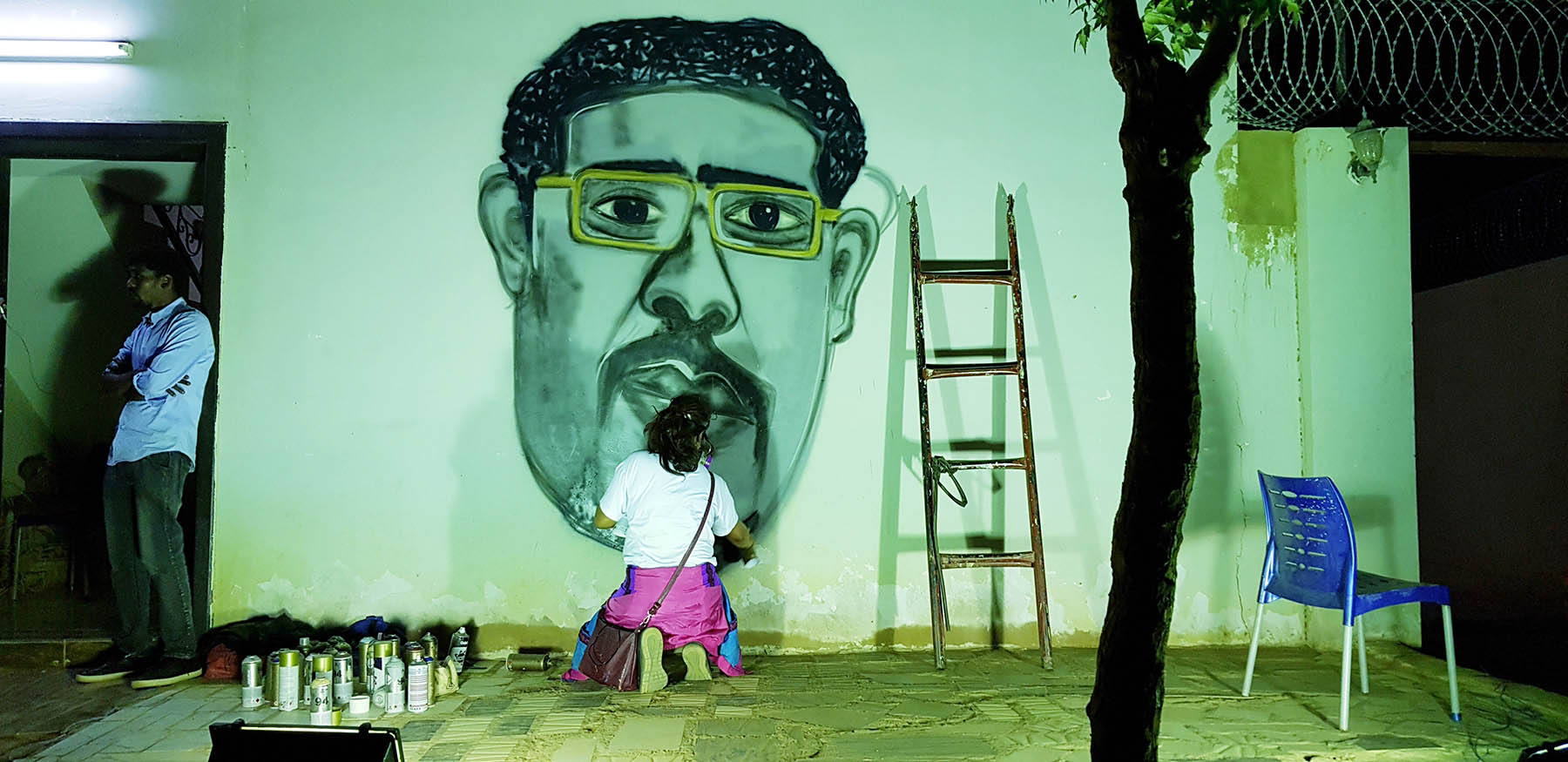
DAWN: How has life in Sudan changed since the revolution?
Diab: All the changes I have seen in Sudan are for the worst. Everything is declining- the living standards, medicine, education, cultural life. Inflation is at 40%. I am witnessing the downfall of a great nation. It is sad to say I am one of the lucky ones who made it out, but I am not any less affected by the collapse. It has probably been affecting me emotionally and physiologically. I've witnessed my journalist friends and activists, and even students being arrested and tortured for protesting for the high prices of bread, etc. I see forceful ruling by an inept president, incriminated for genocide and crimes against humanity, yet, governing for 27 years and counting.
As Dr. Amin Mekki Medani, 72, a human rights lawyer and president of the Confederation of Sudanese Civil Society Organizations, said: "We really need a consensus on who would replace this government and that, I must admit, is not on the table at the moment."
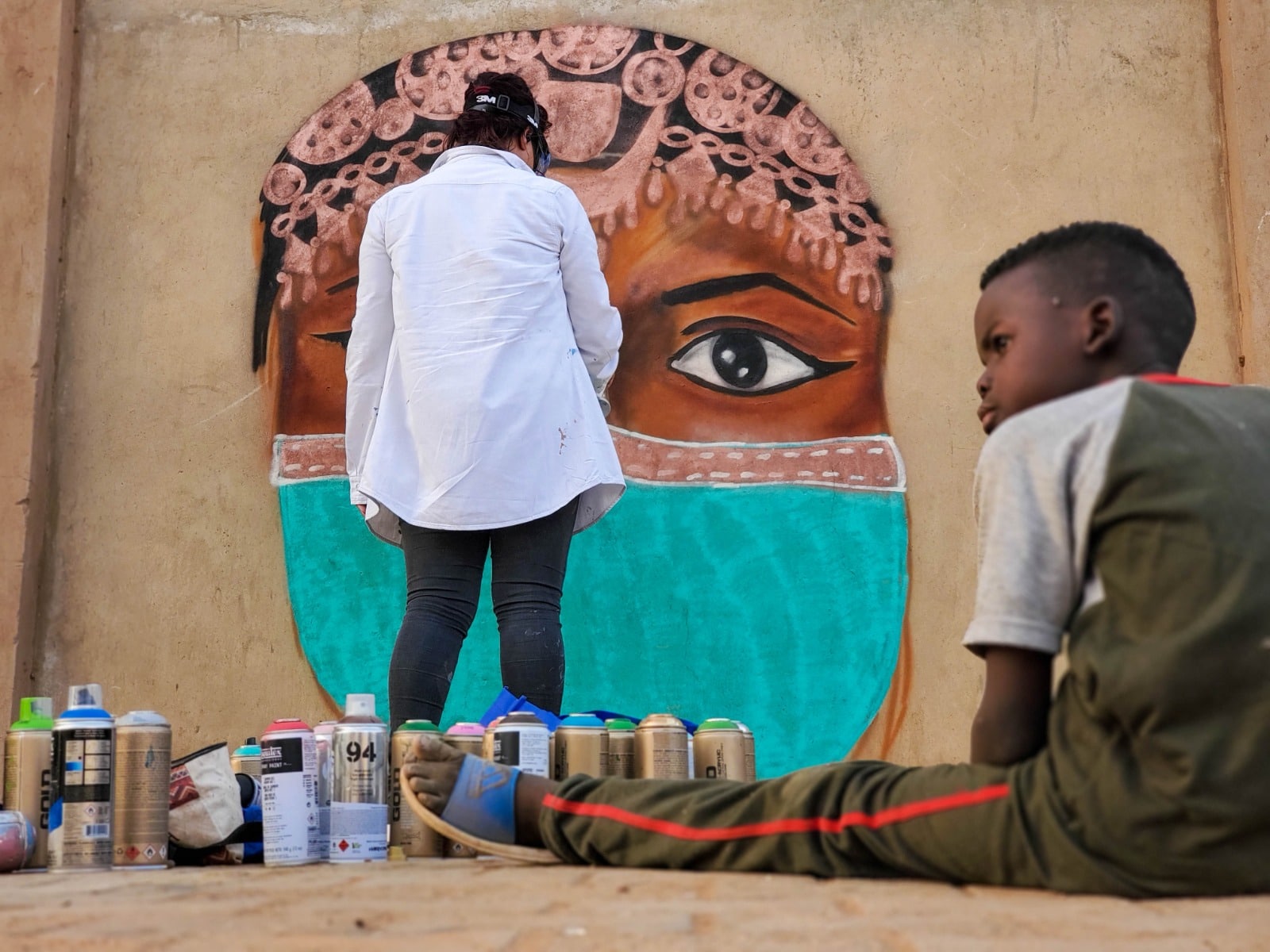
DAWN: What changes would you like to see in Sudan?
Diab: The first change I'd like to see is stable and strong economic growth. We are in dire need of social, economic, and national security. In the highly diverse Sudan, both ethnically and linguistically, there is a lot of ethnic tension; people need to stop labeling each other by their ethnic groups or by the percentage of their African/Arab blood. The separation of the oil-rich South Sudan in 2011 only heightened the economy's downfall in the largest and most resourceful country in Africa. I want Sudan to be whole again. To do that, the government needs to focus mainly on the emotions, wants, and needs of the people.
I wish to see media or freedom of speech, and with that comes artistic sovereignty. I know I speak for all artists when I say we can highly increase our creativity level when there is no sense of oppression. And finally, I wish to see religious freedom. Government should not fuse private practices with what is good for the community.
As a street artist, I aim to reflect a positive image of Sudan, regardless of everything that's going on. I want to put Sudan on the map when it comes to art, to show that it is a flourishing and vivacious society in its own right.
DAWN: What are you doing now?
Diab: Street artwork is my profession. If it wasn't for the revolution, if it wasn't for COVID in the past year, I would be pursuing an artist residency in Washington, D. C. through the World Bank. And then I was supposed to fly out to Belgium in Brussels for a hip-hop festival. I do have good standing internationally, and I did a workshop in Germany last year as well. I was in Egypt for the World Youth Program. This is my full-time thing. In Sudan it's not a job, it is community work. For example, during the COVID crisis, I did a few street art campaigns supporting the idea of staying at home and wearing your mask because at that time, the virus was still fresh in March, and people didn't know what to do and how to handle it. One of these murals won a dissemination award by UNESCO.
Currently, I'm painting the lions' cages at the Sudan Animal Rescue here in Sudan and working on a documentary with my friend, director Sanosi Adam, about the martyrs' graffiti project and the revolution.
Assil Diab on Twitter, Instagram, and Facebook.
* Theodore Nappo and Jack Steele contributed to this interview.
***
Photo: Assil Diab posing with street kids in AlMashtal Street, Khartoum, and her street art campaign on raising awareness on the coronavirus pandemic and the importance of staying home. This mural won a dissemination award from UNESCO & i4policy.
